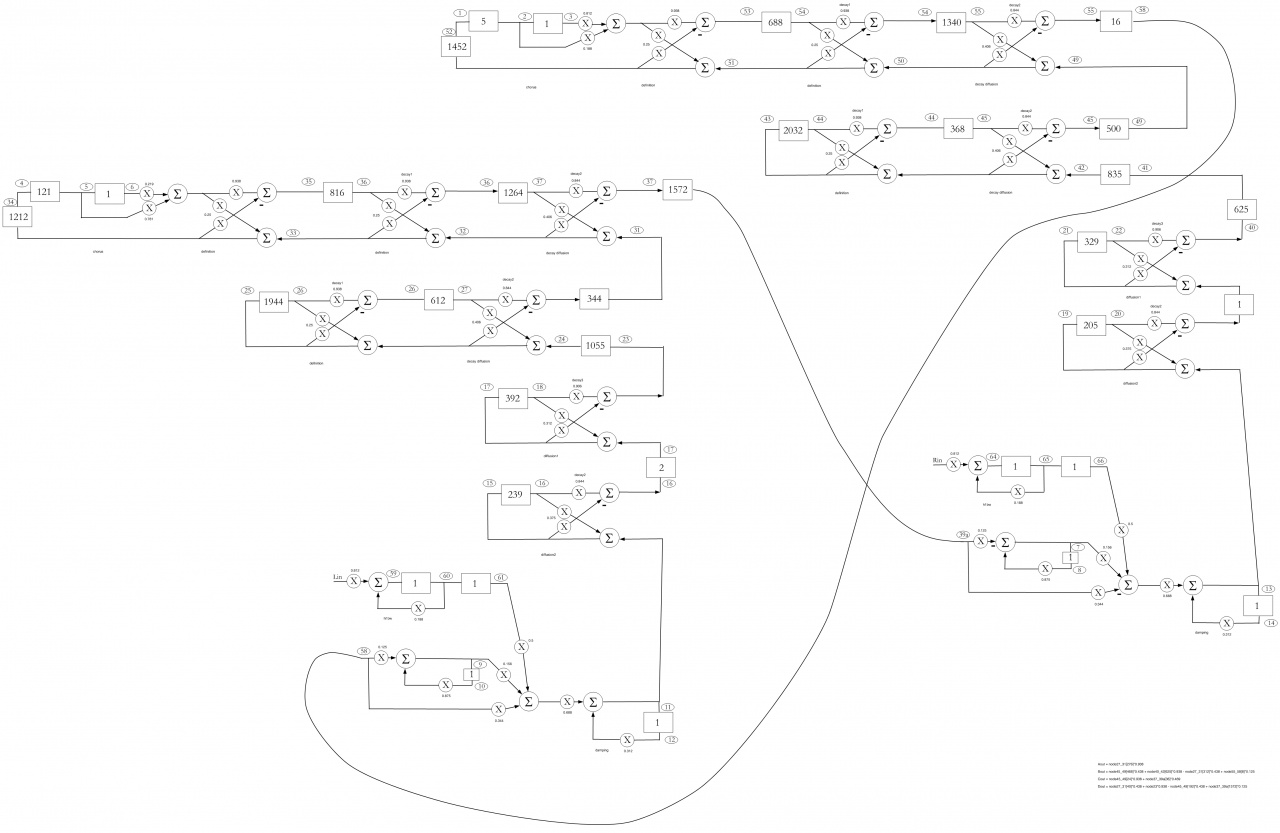Dattorro Convex Optimization of a Reverberator
From Wikimization
| Line 1: | Line 1: | ||
| - | [http://www.convexoptimization.com/wikimization/index.php?title=Special:Userlogin&returnto=Special:Userlogout Login] required to [http://www.convexoptimization.com/wikimization/index.php/Special:Emailuser/Dattorro E-mail this user].<br> | ||
| - | If you do not already have an account, [http://www.convexoptimization.com/wikimization/index.php?title=Special:Userlogin&type=signup create one here]. | ||
| - | |||
| - | mailto:dattorro@stanford.edu [http://www.stanford.edu/~dattorro Jon Dattorro] | ||
| - | |||
==Convex Optimization of a Reverberator== | ==Convex Optimization of a Reverberator== | ||
Given this industrial-strength topology for reverberation of audio, it is an open question to derive a method for choosing delayline lengths such that perceived decay is exponential. In layman's terms, it is difficult to choose delayline lengths that will not cause undulation in this reverberator's decay-tail in response to an impulsive input. | Given this industrial-strength topology for reverberation of audio, it is an open question to derive a method for choosing delayline lengths such that perceived decay is exponential. In layman's terms, it is difficult to choose delayline lengths that will not cause undulation in this reverberator's decay-tail in response to an impulsive input. | ||
| Line 12: | Line 7: | ||
To address this problem, it may perhaps be easier to begin with the simpler topology presented by [http://ccrma.stanford.edu/~dattorro/music.html Dattorro] | To address this problem, it may perhaps be easier to begin with the simpler topology presented by [http://ccrma.stanford.edu/~dattorro/music.html Dattorro] | ||
in [http://ccrma.stanford.edu/~dattorro/EffectDesignPart1.pdf Effect Design, Part 1]. (Level of difficulty, for this open problem in Optimization, is worthy of a Ph.D. thesis in 2010.) | in [http://ccrma.stanford.edu/~dattorro/EffectDesignPart1.pdf Effect Design, Part 1]. (Level of difficulty, for this open problem in Optimization, is worthy of a Ph.D. thesis in 2010.) | ||
| + | |||
| + | |||
| + | ---- | ||
| + | [http://www.convexoptimization.com/wikimization/index.php?title=Special:Userlogin&returnto=Special:Userlogout Login] required to [http://www.convexoptimization.com/wikimization/index.php/Special:Emailuser/Dattorro E-mail this user].<br> | ||
| + | If you do not already have an account, [http://www.convexoptimization.com/wikimization/index.php?title=Special:Userlogin&type=signup create one here]. | ||
| + | |||
| + | mailto:dattorro@stanford.edu [http://www.stanford.edu/~dattorro Jon Dattorro] | ||
Revision as of 23:20, 1 July 2010
Convex Optimization of a Reverberator
Given this industrial-strength topology for reverberation of audio, it is an open question to derive a method for choosing delayline lengths such that perceived decay is exponential. In layman's terms, it is difficult to choose delayline lengths that will not cause undulation in this reverberator's decay-tail in response to an impulsive input.

Choice of delayline length is an optimization problem because one must simultaneously insure that the network provides good musical qualities; e.g., a good reverberator should provide little coloration (input spectral change).
To address this problem, it may perhaps be easier to begin with the simpler topology presented by Dattorro in Effect Design, Part 1. (Level of difficulty, for this open problem in Optimization, is worthy of a Ph.D. thesis in 2010.)
Login required to E-mail this user.
If you do not already have an account, create one here.